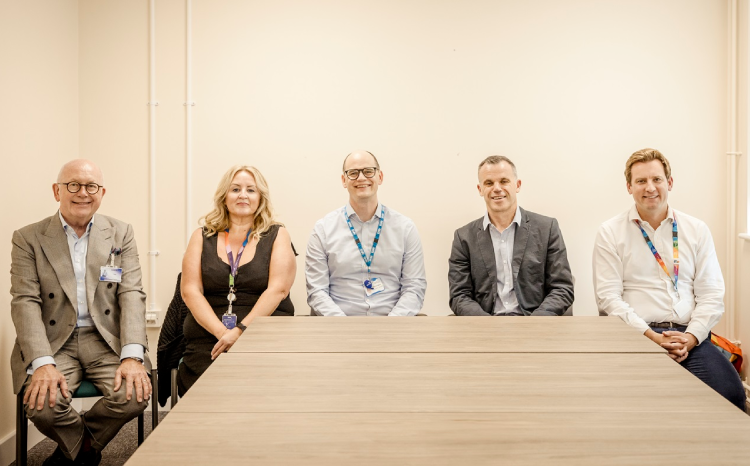Digital Health Coffee Time Briefing ☕
- 15 July 2025

Your morning summary of digital health news, information and events to know about if you want to be “in the know”.
👇 News
🚀The eighth DigitalHealth.London Launchpad has opened for applications. The 10-week hybrid programme aims to equip companies with the knowledge they need to refine and launch their solutions targeting current NHS and social care challenges. Applications are open until 13 July at 11.59pm and the programme will run from 18 August until 23 October 2025.
🤝 A new strategic partnership has been announced between DNV Imatis and SmartCo Future Health, with the goal of improving operational efficiency across the UK healthcare system. It will see SmartCo Future Health act as a dedicated delivery partner for healthcare providers implementing the DNV Imatis platform, which helps to create a fully integrated hospital ecosystem.
📢 During NHS ConfedExpo, clinicians from East Lancashire Hospitals NHS Trust highlighted how their use of CLEARnotes, an ambient voice technology (AVT) solution, led to a 14% increase in productivity. This uplift was recorded between September 2024 and March 2025, in their nurse-led perioperative assessment service, compared to the previous six months. The team reported that were able to see more patients daily without compromising safety or quality of care.
🫄 Following long-term use at Milton Keynes University Hospital NHS Foundation Trust and University Hospitals Dorset in Poole, the Reassure Pregnancy system, from Camgenium, is being used to improve outcomes for pregnant women at risk of pre-eclampsia. The system allows pregnant women to monitor their symptoms via an app, with the data shared in real-time to clinicians.
👩⚕️ ivWatch, LLC, has received market authorisation under its EU MDR CE Mark for the detection of iron extravasation events by its patented SmartTouch Sensor and IV site patient monitoring system. The Class II medical device uses visible and near-infrared light and a predictive algorithm to continuously monitor peripheral IVs to help with the early detection of IV leakage events.
❓Did you know?
It has been 25 years since scientists unveiled the first draft of the human genome. This historic achievement, published on 26 June 2000, transformed understanding of biology.
The Wellcome Sanger Institute, which contributed nearly a third of that initial sequence, is now looking ahead to the next quarter-century of genomic breakthroughs.
What once took almost a decade to sequence, the Sanger Institute can now achieve in just 11.8 minutes for a gold-standard human genome. This speed, combined with the power of AI, is set to revolutionise medicine and our understanding of life.
Looking forward, genomics promises to shape clinical practice, track global disease outbreaks like dengue moving into Europe, and even inform personalised medicine approaches for conditions from cancer to sepsis.
The expansion of the Wellcome Genome Campus, a massive investment in UK life sciences infrastructure, underscores the collaborative and open science spirit driving these advancements.
📖 What we’re reading
A blog from the Digital Care Hub, published on 25 June 2025, highlights that the health, care and wider public sectors are reluctant to openly discuss cyber attacks.
It suggests this silence is often driven by fears of reputational damage, concerns over regulatory penalties, and a misunderstanding of what can legally be disclosed after an incident.
This fear of transparency, the author argues, actively hinders collective cyber resilience. When organisations stay quiet, valuable lessons from incidents are lost, patterns of attack go unnoticed, and the opportunity to build a shared understanding of evolving threats and effective defences diminishes.
Despite common misconceptions, UK data protection laws do not prohibit the sharing of anonymised or generalised learnings from cyber incidents. In fact, authorities like the National Cyber Security Centre and the Information Commissioner’s Office actively encourage responsible information exchange.
The piece calls for a fundamental shift in mindset. It advocates for normalising the discussion around cyber incidents, moving away from a culture of blame towards one of support and collaborative learning.
This, the author suggests, is crucial for strengthening collective defences and better preparing all organisations for the inevitable future of cyber threats.
The piece also highlights the positive steps that have already been taken towards this shift in mindset – for example, NHS England’s Data Security Centre promoting the value in learning from incidents and the support for care providers to reflect and share safely thanks to the Local Government Association and the Better Security, Better Care programme.
🚨Upcoming events
31 July, online event – NHS Digital Health 2025


